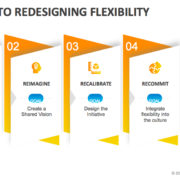Highlights from our Recent Pulse Poll: Future of Work
As a think tank dedicated to creating work environments centered on inclusion and innovative thought leadership, the Alliance is committed to providing our members with original research on trends and data focused on workplace flexibility, diversity and inclusion.
To this end, we launched two pulse polls during the pandemic to understand trends, successes and challenges related to workplace flexibility during the crisis. Our first poll, Pulse Poll: COVID-19 & Reentry, was released in July 2020 and remains available to our members. Our second poll, Pulse Poll: Future of Work, will be released soon and will provide our members with valuable trends regarding policies, practices and infrastructure organizations plan to offer to support workplace flexibility post-pandemic.
As a sneak peak to the soon-to-be released Pulse Poll: Future of Work, we found that organizations remain committed to making remote work available after the pandemic. Specifically, over 70% plan on creating/updating their remote work policies post-pandemic. Notably, every participant without a remote work policy currently in place plans to create one. Further, we also found that nearly two-thirds of participants plan to make their remote work policies more inclusive by including all employees.
These trends demonstrate the need for all organizations to revisit their flexible work policies post-pandemic and include all employees in these policies. Organizations who do create/update their flexible work policies will fall behind the curve in terms of workplace flexibility which will affect their talent recruitment and retention. Additionally, organizations who just choose to include certain employees in their flexible work policies will face retention/satisfaction issues with employees not offered flexible work, especially considering that many other organizations will be making their flexible work policies more inclusive. In order to include all employees and serve as many employee needs as possible, we strongly suggest adopting holistic flexible work policies (i.e. reduced hours/part-time; telecommuting; flexible start-end times; compressed work week; job sharing; sabbatical offerings) as opposed to just remote work policies. This way, organizations can offer flexibility to all employees, even those who need to be in the office due to their function.
For more information on our research initiatives, please contact Sejal Shah at sejal@dfalliance.com.




